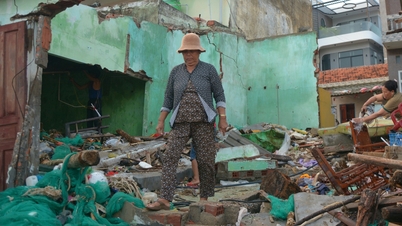
Experts say that with the current level of interaction and frequency of appearance, in order to avoid becoming a victim of fake news, spam, and online scams, it is very important to equip ourselves with the skills and knowledge to identify and prevent them.
increasingly sophisticated tricks
Many people have accidentally become victims of fake news and have had to call for help from the authorities. Such is the case of Ms. Nguyen Thi Tuoi, residing in Dong Nai province. In April 2025, her nephew NHL had health problems. Due to difficult circumstances, she asked her family to post information online for community help. When L.'s health was stable, the family deleted this information.
However, recently, a clip about a girl being kidnapped and assaulted, resulting in a traumatic brain injury, appeared online. The poster stated that the kidnapped girl was Mrs. Tuoi's granddaughter and called for charity to help the two of them. However, the account number provided in the post did not belong to Mrs. Tuoi. Through local verification, all information about the incident was edited and completely fabricated.

According to Ho Chi Minh City Police, in order to spread quickly, fake news and scams are often created by subjects from announcements, policies of the city government, charity information, celebrities, disasters, natural disasters,...
For example, during the Covid-19 pandemic, a lot of fake news was spread by fake subjects claiming to be instructions from city leaders. After being posted, the fake news spread at a terrifying speed, so many people believed it was “real news”.
Young people, the group that uses the internet a lot, also find it difficult to avoid the “attack” of online scams. The pressure to share quickly, to express opinions, and the lack of practical experience makes many students easily “led by the nose” by scammers, unintentionally becoming links in the chain of spreading toxic, unverified information.

According to statistics from Ho Chi Minh City Police, from 2020 to mid-June 2025, authorities handled more than 1,000 cases of social order violations involving more than 2,700 students.
On a national scale, in 2024 alone, online scams caused losses of up to 18,900 billion VND, nearly double that of 2023. For every 220 smart device users, one person became a victim of scams; up to 70% of people are exposed to at least one scam call, text message, or other form of scam every month.
Improve identification and response skills
Recently, the problem of “online kidnapping” is causing anxiety in society, especially among young people. According to the Ministry of Public Security , from mid-2024 to August 2025, 50 victims were successfully rescued. All victims were between 18 and 22 years old, mainly students, with 90% of them being female.
The question is why are people who are considered knowledgeable, have daily access to technology and social networks, the main victims of a series of online kidnappings?
Sharing with students at the discussion on "Identifying and combating fake news in the AI era" recently organized by Tien Phong Newspaper and Ho Chi Minh City University of Transport, Captain Huynh Do Tan Thinh, an officer of the Special Police Team, Criminal Police Department, Ho Chi Minh City Police, said that many students are dependent on short, in-depth information instead of official sources. Many young people are spending hours surfing through short clips instead of reading an article, watching news bulletins, and in-depth topics.

From the investigation, Captain Thinh warned that many fake news, false news, and scammers' methods of luring people come from short video platforms. Consuming too many short videos makes viewers "think quickly but shallowly, easily manipulated emotionally, and have difficulty distinguishing between truth and falsehood."
Short videos touch emotions but make people lazy to think. Over time, we get used to 'simplifying information, losing the ability to debate'. Having few opportunities to interact with reality and lacking basic skills, especially not sharing when encountering problems related to fraud, makes it very difficult for young people to escape from the traps set by the subjects.

According to statistics, there are up to 24 forms of online fraud and many other forms of lures used by scammers. However, to prevent and proactively respond to fake news and online fraud, the core factor is still each person's skills, awareness and ability to verify information.
Captain Thinh emphasized: No matter how modern the technology is, if you just "slow down" and take steps to verify and check, it will be very difficult to fall into a scam trap.

From the perspective of a technology expert, Mr. Vo Do Thang, Director of Athena Cyber Security Center, proposed solutions: When receiving information, you need to stay calm to verify, even "reverse check" with the smart sender.
In the fight against fake news and online scams, victims should not handle it on their own but need the support of friends and family and notify the authorities as soon as possible before things get out of control.
Source: https://nhandan.vn/nguoi-tre-ung-pho-voi-tin-gia-lua-dao-truc-tuyen-nhu-the-nao-post921148.html






![[Photo] Da Nang: Hundreds of people join hands to clean up a vital tourist route after storm No. 13](https://vphoto.vietnam.vn/thumb/1200x675/vietnam/resource/IMAGE/2025/11/07/1762491638903_image-3-1353-jpg.webp)
































































































Comment (0)